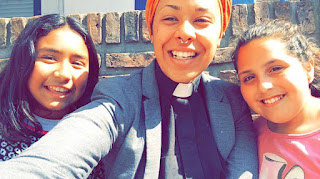Sometimes I feel like I live in a war zone. Dogs roam on dirt roads lined with barbed wire fences. Bars kiss the glass windows like long distance lovers reuniting. Exposed bricks meet, creating four corners of separation. Los Perros de las Rejas lay at the entrance to stare at the youth in the street. Between noon and 3pm silence encompasses the neighborhood. Walls come down on the market place likes curfew in the U.S. Los Pitufos wait on the corners, cackling with each other. What are they waiting for?
In real time I do not live in a war zone. The fences open with abuelitas holding llaves greeting friends with love. Men throw panchos into las calles for the street dogs to eat.3pm is met with preparations for merienda, a snack time filled with coffee, tea, and postres. Abuelas welcome me compartir en merienda, to share in this meal time. Dirt roads are traced with rays of sunshine while the wind runs through trees. Lemon trees that arch over walls so tall. Branches do not feel fear like we do.
My roots were not watered with the same fear of my neighbor. We never broke glass bottles to surround our home. Fences were for animals so that they would not flee. Why do I live in a cage to keep myself in, or is it really those in the cages that are not to be trusted?
Then again I have never been a person to keen on safety. I have watched the same house be robbed three times in my youth and still keep the doors unlocked. So many times have I walked the city streets past three with a dead phone and lost conscious. Back home the news will run for hours about theft, rape, murder, and kidnappings. Maybe if I did not know that even flowers have thorns and soft plants can be poisonous I would treat my neighbor more as a stranger. But I still frolic in the meadows.
But this image of war and brokenness is not as foreign as the land where I walk. I cannot forget the empty homes and filled streets of Philadelphia. The homeless, many refugees in the "War Against Drugs." How many residents have been displaced through gentrifying quadrants? Citizens abandoned like the schools that no longer exist. Pigs sit in their cars waiting to take aim. Or am I speaking of Baltimore? I meant to say Charlotte. Tulsaintpaoakland. Ferguson, the seeds. Bodies make for rich soil in a poor land. My mind wanders home to check on the garden, only to see someone has added more manure.
I sit outside behind rejas and pareds as I rethink my idea of safety. The golden cerradura shines in the sun like treasure, the link that shuts out the world. The leaves of neighbor trees whisper secrets from across the bricks. I can still follow the sky out of my dwelling. Is it just as blue in the garden back home or has the sangre of the soil stained the skies too? Birds chirp at each other breaking the silence of town. It is peaceful with closed eyes. Eyes shut like fed mouths. I am tired of looking at my stone cage but then I remember why it is here. I am safe, right? They have taken me from the garden and placed me to tend to the lemon trees. But I have never really been a gardener. I have never been a soldier either. Some only see me as good soil in a field of seeds. May my body ever meet the earth, by God let those seeds grow.
Sometimes I feel like I cannot escape. I want to write about things that make me smile but the only words I have are "Hands up, Don't shoot." Over Five Thousand Miles away and I am just starting to feel secure behind my barbed wire fences and bar kissed windows, something I would have feared back home. My toes wrestle in new grass kicking futbol with the youth. I run from children during Pika on the patio. We spend spring nights together within holy walls. They too stare at stone cages but unlike me, they see home. I yearn to look at the same clay and see sculptures instead of barricades. I dream of seeing the beauty before the grotesque. One day maybe I will not be so captured by what is growing in the garden that I can enjoy the fresh lemons off of the trees. This is home now. Rest your head Nic. This is home.
#ReclaimMissionary
Vocabulary
Los perros de las rejas/ Dogs of the gates
Los pitufos/ Smurfs (Slang for Police)
Abuelitas/ Grandmothers
Llaves/ Keys
Pancho/ Hotdog
Calles/ Streets
Merienda/ Meal time common between 4-6pm
Postres/ Desserts
Compartir/ To share
Tulsaintpaoakland/ Tulsa, St. Paul, Oakland
Rejas/ Gates
Pareds/ Walls
Cerradura/ Lock
Sangre/ Blood
Futbol/ Soccer
Vocabulary
Los perros de las rejas/ Dogs of the gates
Los pitufos/ Smurfs (Slang for Police)
Abuelitas/ Grandmothers
Llaves/ Keys
Pancho/ Hotdog
Calles/ Streets
Merienda/ Meal time common between 4-6pm
Postres/ Desserts
Compartir/ To share
Tulsaintpaoakland/ Tulsa, St. Paul, Oakland
Rejas/ Gates
Pareds/ Walls
Cerradura/ Lock
Sangre/ Blood
Futbol/ Soccer
















